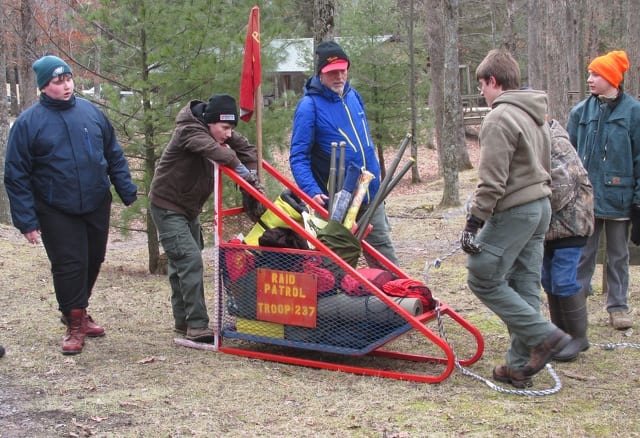SPRING MILLS — The 45th annual Klondike Derby was held at the Seven Mountains Boy Scout Camp in Potter Township Feb. 6.
About 426 Scouts from many locations in Pennsylvania and Maryland brought 78 teams to compete in this year’s derby. This event is a competition between Boy Scout patrols, which pull dog sleds to several stations located around the campground. Each station presents a task for the boys to complete while being judged on their skills, efficiency and teamwork. The adult judges are former Scouts, leaders and community volunteers.
Sleds manned by patrols of three to five boys in either the Scouts, or Iditarod, class or the Webelos, or Malamute, class were started in four groups of each. The boys spent several hours towing their equipment-laden sleds around the camp grounds from station to station, completing their assigned tasks. The lack of snow on the ground this year made for some tough work for the boys doing “sled dog” duty.
Tasks include cooking breakfast, archery, skeet shooting, first aid and several others. The boys learned lessons in teamwork, leadership and working in cold weather.
The Klondike Derby, which is the largest annual event held in the Seven Mountains Camp, is sponsored by the Juniata Boy Scouts Council, which includes Mifflin, Juniata, Huntingdon and Centre counties. The organization of the derby was headed by Paul T. Fagley, who was a participant in the 1974 event. His father, the late Paul J. Fagley, was chairman of the event for 36 years. This was Fagley’s 35th year serving either as chairman or co-chairman.
Fagley said the theme of this year’s derby was “The Great Race of Mercy,” which refers to a dogsled relay that delivered a life-saving serum 675 miles to fight an outbreak of diphtheria in Nome, Alaska, in the winter of 1925.
Nome, located on the western face of Alaska on the Bering Sea, was icebound in winter, thus making it inaccessible by ship. No roads or railroads led to the town, and the only aircraft in the area was grounded, so the only viable option was a dogsled relay. Two teams of dogs and mushers started at Nenano, near Fairbanks, and at Nome, heading toward each other to meet in Nulato. From there, the serum was handed off to fresh teams that headed back to Nome.
The total trip, which usually took 12 to 15 days, was made in just five and a half days, with the precious serum arriving in Nome on Feb. 2, 1925. There were 20 mushers and more than 150 dogs involved in the herculean effort to prevent an epidemic.
Fagley said people around the country followed the teams’ progress via newspapers and the newly popular medium of radio. Balto, the lead dog in the final leg of the journey, became an instant celebrity, and a statue of him was erected in New York City’s Central Park to honor all the dogs in the run, including many who gave their lives in the effort. Today, the famous Iditarod Trail Dog Sled Race in Alaska commemorates that event.
Following the theme, signs bearing the names of Alaskan towns along the Great Race of Mercy route were posted at the various Klondike Derby stations. At the Webelos cooking station, a Scout from Pack 44 of Pine Grove Mills read the story aloud to his fellow troop members.
Fagley added a new task, the Cargo Express, to this year’s derby. The teams were given several small, delicate items, such as a grain of rice, a piece of uncooked spaghetti, a potato chip, a marshmallow and a crouton, and had to transport them through all the stations, returning them undamaged. “We like to add a fun event sometimes,” said Fagley.
Fagley said that even though the Scouts’ activities are judged, the derby is not primarily a competition. “The boys come here to be challenged,” he said, “and they leave here with a sense of accomplishment.”



